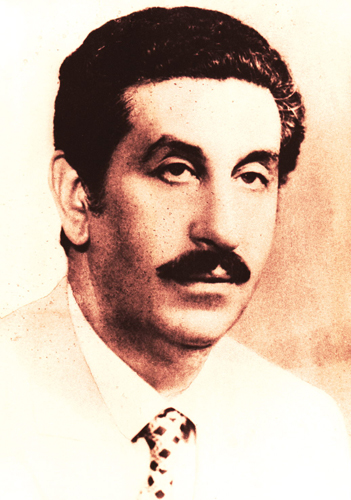Muhammad al-Najjar ‘Abu Yusef’, who was assassinated by the Israeli Mossad with his two companions Kamal Nasser, and Kamal Adwan in Beirut on this day in 1930, was born in the village of Yabna, Ramle district, and completed his primary education there, then moved to the Abrahamic College in Jerusalem, where he finished his secondary education .
After that, he returned to his hometown to work as a teacher until the Nakba in 1948 forced him to leave his village and go to Al-Shabura neighborhood in the Rafah camp for Palestinian refugees in the Gaza Strip, and in it Muhammad Yusef al-Najjar worked in the education sector until 1956.
Abu Yusef was known in Rafah camp and in the Gaza Strip in general for his patriotic stances, and was arrested for the first time for four months in 1954 for leading a demonstration in which he demanded the compulsory recruitment of Palestinian youths.
He was arrested again in March 1955 for leading one of the demonstrations in protest and denouncing the settlement project in North Sinai that the Refugee Relief Agency tried to implement.
Abu Yusef left the Gaza Strip on board in 1957 to Syria, from where he headed to Amman, and then went to work in the Qatar Knowledge Department. Al-Najjar is considered a founding leader and the owner of most of the movement’s starting points and goals. He was elected as a member of the movement’s central committee since its founding in 1965, and in 1967 he was finally vacated by Fatah movement. Muhammad Yusef al-Najjar was elected at the fifth session of the Palestinian National Council, which was held in Cairo in 1969, as a member of the Executive Committee of the Palestine Liberation Organization representing Fatah movement, and he was chosen as the Chairman of the Supreme Political Committee for the Palestinians in Lebanon. In the eleventh session of the Palestinian National Council in Cairo from 6/12/1973, his membership in the organization’s executive committee was renewed, and he was assigned to head the political department there. Abu Yusef participated in many Arab and international conferences and seminars, and he always emphasized the Palestinian Arab people’s rejection of Security Council Resolution 242 and the Palestinian resistance’s insistence on fighting until victory, and he called on Arab and friendly countries to increase their support for the Palestinian revolution. He represented Palestine in the Conference of Arab Defense Ministers in Cairo, and led the Palestinian delegation to the conference, and in the Fourth Islamic Conference, which was held in Libya from 3/26/1973, Muhammad Yusef al-Najjar headed the Palestinian delegation.
On the night of April 10, 1973, a group of the Israeli Mossad blew up the entrance to the martyr’s apartment, to break into the house where the martyr was sleeping in his room with his wife Rasmia al-Najjar (his aunt’s daughter), who tried to protect him from the barrage of bullets, and they martyred together, while their firstborn, Yusef, managed to escape.



